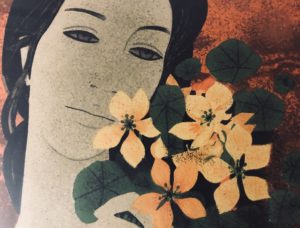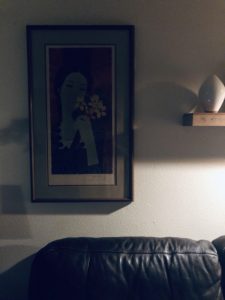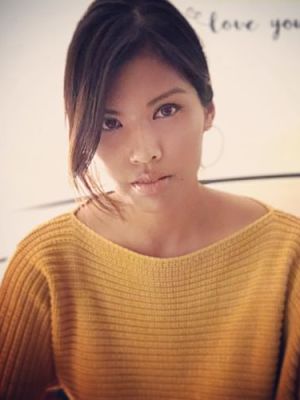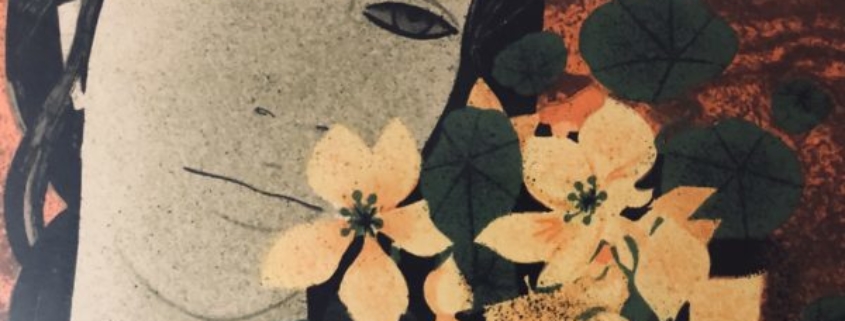Finding the Woman with Jasmine: A Self-Portrait
My husband kissed me in the middle of the night eight months ago, but I didn’t feel him leave until I reached for the dip in the bed. We had received Army orders for his deployment overseas and prepared for the reality our family would face. I had lived in Los Angeles for eight years, but four years as a married woman and now mother to our children. The liberties of living “single” looked different now and frightening. I promised to be the same woman he left, a wife waiting, even if that meant reserving an empty space he wouldn’t occupy.
I always held onto the improbability he hadn’t really gone. The day he left—and I knew he left—I ran down the stairs expecting to see him making coffee, but the bench was clean where his boots sat. The hot twinkling from his car engine’s had long left the garage. We were ripped from each other like a Band-Aid.
I bought a calendar for the kitchen wall to count the 321 days he would be gone and fanned the thickness of the months. Vulnerability followed me to the sore places at the dinner table, or on the days I toted our three kids around on errands and another stranger would grin and say, “looks like you got your hands full.”
My husband, a collected military man, would call us twice a day crazy with affection. We set online dates and delayed saying goodbye like we did when we first met, and then I’d feel the rush of sobbing my eyes to prunes.
The early days without a partner can be painfully misleading. His closet was still his. The dip in the bed was still his. My son would cross another day’s box out and we’d cheer together. Missing someone was sweet adrenaline.
* * *
The bar was full of superficial intimacy sparking potential affairs. In the corner, a couple too hopeful to be steady, the collagen-plump young eating baskets of bread, carefree arms swooping for hugs but tipping Happy Hour glasses, and the bartender dispensing liquor at the counter. I was a bystander on the outskirts, infiltrating the nightlife crowd carefully as he followed me to an open spot at the bar and offered to buy me a drink.
We were co-workers last year, but the office rapport quickly turned into a warm, platonic relationship. Formal greetings became text updates about his new job, complaints about traffic, his long-term girlfriend, our love of tequila, my husband, our darling children.
Nothing significant over the months, but then a message: “Hey, I have your painting.”
A lithograph I found on a whim at a NoHo thrift store. The woman with cocoa tendrils around her face; a divine and unwavering gaze over the stalk of yellow jasmine she clutched to her chest.
I saw her above the staggering pile of used throw pillows. The cashier, tight-lipped and shrewd, brought her down for me and placed her out of arms reach onto a glass counter. She offered me a price based on my obvious enthusiasm. I surprised myself when I blurted out a barter and received twenty-five dollars off.
My arms bound around the frame all the way to my office. I leaned her against the white space of my desk. She wasn’t hiding anymore.
When my husband left, I decided to quit my job and stay home with the children. It was a hot June afternoon in the valley when I packed my work belongings. The lithograph was the last item on my desk, but leaving was a sweaty, disorganized haul and I had forgotten all about her when I handed in my key. My co-worker had stopped by on his way home one day and found her stuffed in a closet.
Of course, I wanted her back. “Let’s meet,” I replied. Only a quick exchange and a harmless drink.
* * *
My mother had a formula for a love story. She divorced my father when she met my step-father, and they bought a white house together. She clung to that formula for 13 blissful years, but infidelity snuck into the spaces of his body that were abandoned.
Maybe the entry point for my step-father was an evening out with friends or another woman’s laugh—the woman at work. Maybe it was the fact that he was now 50-years-old and married for 13 years. Maybe it was a refreshing secret phone call or a new image.
I could only assume that when my step-father denied my mother, it was an extraordinary disorder to the equation she trusted for the rest of their lives. My mother lost 25 lbs and moved into her own apartment before they reconciled.
Even after forgiveness, she warned me about marriage. It shook my perception of certainty. Each family member grieved the loss of an image in our own way. I loved like there wasn’t a formula, only catastrophe.
* * *
Something happens when you miss someone too long. The longing becomes emptiness, the homeostasis. The shirt was vacant. Space was occupied by stacking one measuring cup into another.
Halfway across the world, my husband woke up for work from a windowless shipping container to sit in an office made from another shipping container.
“How was your day?” these messages came day-after-day. What he really meant was, How were the kids? Conversations like this were the death of marriage without divorce.
I turned over in the bed and went to sleep.
* * *

Our conversation began with formalities at the bar. How is life? Plainly—I’m well. When I responded, my body was a bucket, and words sounded like the hollow beat of its bottom.
I always assured my ego I wouldn’t let myself go when I was young, but self-care after motherhood is cumbersome. I traded in the small luxuries for rapid, efficient tasks. My house was a tight ship, my husband used to say. That’s how parts of me began disappearing until I was just a working part in the ship. First, to my husband and then myself.
My haphazard ponytail and black cloak were impenetrable. I was foolish to think it. I hadn’t been close to feeling anything in months, but in the axis of the noisy room, I sensed his leg pressing into mine. My breath quickened and filled my body with the rush of familiar catastrophe.
What came out of my mouth was uninteresting, but later, I noticed my body sitting up straighter. He leaned in closer. Soon, I was weaving stories and throwing my hands in the air. The more I rambled, the more I craved his proximity. He squeezed my hand, and I went on and on. I was aware of my ignorance. The blatant desperation for someone, anyone, to validate my experiences as unworldly: he inquires. Go on, go on. Eyes open, I spilled my desires and ambitions onto the wafer napkin below a wet glass.
* * *
He set the lithograph into my car and hugged me like a scene out of a tacky movie. While we walked to the car, he offered a proposition. I would be lying if I said I didn’t hesitate, how quickly I soared over sabotage. I think I’ve won.
Outside of the bar room, slumped bodies hurried alone to their cars. Cabana lights flared off on Main  street. The boxes would transform into children’s boutiques and bagel shops by morning. The reality was both heartbreaking and romantic. I stood back from my friend on the edge of the road. Not every self-realization fit in the cloak pocket where I felt for my keys. Not yet.
street. The boxes would transform into children’s boutiques and bagel shops by morning. The reality was both heartbreaking and romantic. I stood back from my friend on the edge of the road. Not every self-realization fit in the cloak pocket where I felt for my keys. Not yet.
I felt then the urgency to go home, take my hand, and reach for the empty spaces in bed. On the drive there, I erupted in intervals of laughter and tears. I felt the rush of shame, flattery, loss, and love. Love for the morning coldness on my shoulders. Love for the coffee I brewed myself, and the children’s cereal bowls overflown. My children, who cross their right leg over left like their father and sob like their mother when she spoke to her husband for the first time; after, sitting on the couch below the picture of a cocoa woman clutching jasmine, waiting for him to come home.
 Cristina Van Orden lives in South Los Angeles with her family and Chorkie. She is currently an MFA Candidate at Antioch University, Los Angeles and Poetry Editor for Lunch Ticket. Her work can be seen or is forthcoming in Chaleur Magazine, Gordon Square Review, HOOT Review, and Silverneedle Press.
Cristina Van Orden lives in South Los Angeles with her family and Chorkie. She is currently an MFA Candidate at Antioch University, Los Angeles and Poetry Editor for Lunch Ticket. Her work can be seen or is forthcoming in Chaleur Magazine, Gordon Square Review, HOOT Review, and Silverneedle Press.





